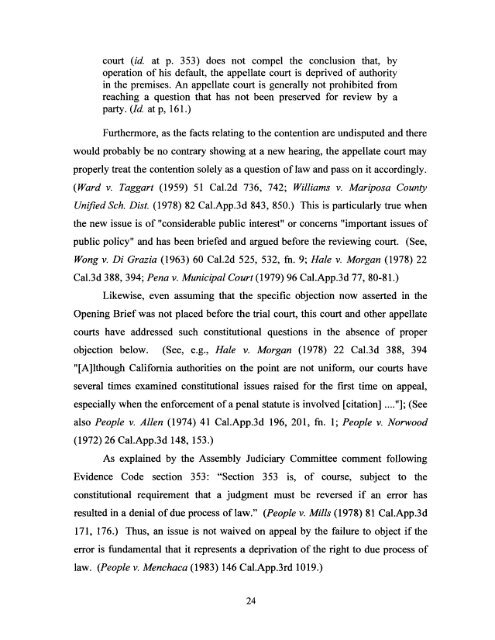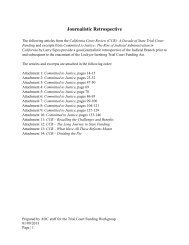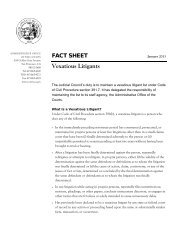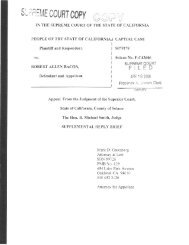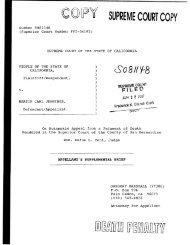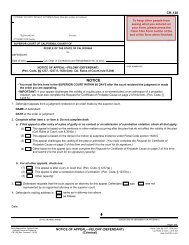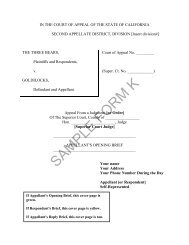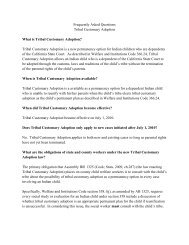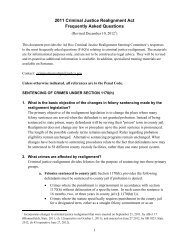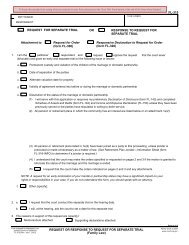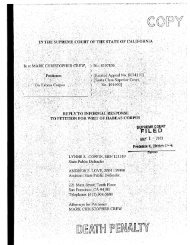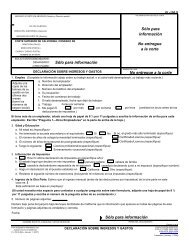Appellant, William Satele, Reply Brief - California Courts - State of ...
Appellant, William Satele, Reply Brief - California Courts - State of ...
Appellant, William Satele, Reply Brief - California Courts - State of ...
You also want an ePaper? Increase the reach of your titles
YUMPU automatically turns print PDFs into web optimized ePapers that Google loves.
court (id. at p. 353) does not compel the conclusion that, by<br />
operation <strong>of</strong> his default, the appellate court is deprived <strong>of</strong> authority<br />
in the premises. An appellate court is generally not prohibited from<br />
reaching a question that has not been preserved for review by a<br />
party. (Id. at p, 161.)<br />
Furthermore, as the facts relating to the contention are undisputed and there<br />
would probably be no contrary showing at a new hearing, the appellate court may<br />
properly treat the contention solely as a question <strong>of</strong>law and pass on it accordingly.<br />
(Ward v. Taggart (1959) 51 Ca1.2d 736, 742; <strong>William</strong>s v. Mariposa County<br />
Unified Sch. Dist. (1978) 82 Cal.App.3d 843, 850.) This is particularly true when<br />
the new issue is <strong>of</strong> "considerable public interest" or concerns "important issues <strong>of</strong><br />
public policy" and has been briefed and argued before the reviewing court. (See,<br />
Wong v. Di Grazia (1963) 60 Ca1.2d 525, 532, fn. 9; Hale v. Morgan (1978) 22<br />
Ca1.3d 388,394; Pena v. Municipal Court (1979) 96 Cal.App.3d 77,80-81.)<br />
Likewise, even assuming that the specific objection now asserted in the<br />
Opening <strong>Brief</strong> was not placed before the trial court, this court and other appellate<br />
courts have addressed such constitutional questions in the absence <strong>of</strong> proper<br />
objection below. (See, e.g., Hale v. Morgan (1978) 22 Ca1.3d 388, 394<br />
"[A]lthough <strong>California</strong> authorities on the point are not uniform, our courts have<br />
several times examined constitutional issues raised for the first time on appeal,<br />
especially when the enforcement <strong>of</strong>a penal statute is involved [citation] ...."]; (See<br />
also People v. Allen (1974) 41 Cal.App.3d 196, 201, fn. 1; People v. Norwood<br />
(1972) 26 Cal.App.3d 148, 153.)<br />
As explained by the Assembly Judiciary Committee comment following<br />
Evidence Code section 353: "Section 353 is, <strong>of</strong> course, subject to the<br />
constitutional requirement that a judgment must be reversed if an error has<br />
resulted in a denial <strong>of</strong>due process <strong>of</strong> law." (People v. Mills (1978) 81 Cal.App.3d<br />
171, 176.) Thus, an issue is not waived on appeal by the failure to object if the<br />
error is fundamental that it represents a deprivation <strong>of</strong> the right to due process <strong>of</strong><br />
law. (People v. Menchaca (1983) 146 Cal.App.3rd 1019.)<br />
24


